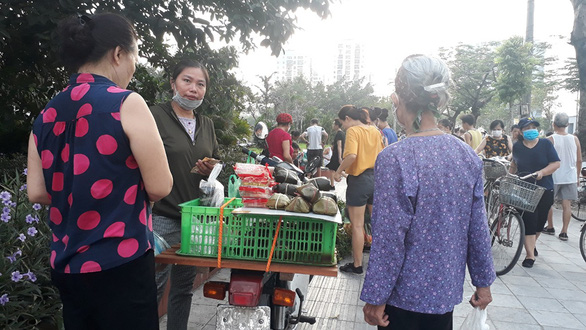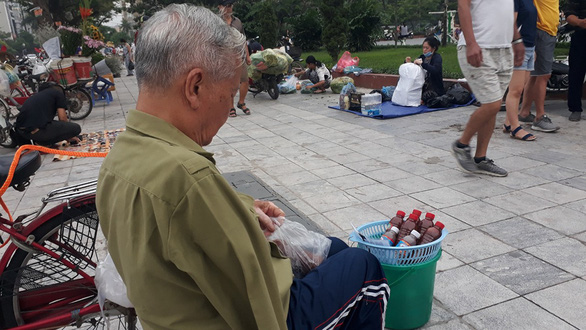Vendors bring all kinds of commodities, such as vegetables, food, shoes and T-shirts, to their ‘stalls’ along the entrance to a park or around a lake, where many locals gather to do exercise.
Such temporary markets just operate at dawn and will close shortly when residents return home to prepare for a new day.
Comfortable and convenient
Nguyen Thanh Loan, who is exercising in her casual wear, carries many kinds of food by both hands, such as vegetables, fruits, meat, and some kinds of cakes.
“The food is enough for breakfast, lunch, and dinner for my family,” said Loan.
“I don’t have to go to a traditional market anymore. Tomorrow morning, I’ll shop again to buy fresh food.”
In Hanoi, residents enjoy working out at Den Lu Lake in Hoang Mai District.
They often finish exercising at around 6:30 am every day and it is time to take a look at small trays piled up with all kinds of vegetables and food.
Despite a temporary market, it offers various categories of goods, mainly vegetables, fruits, meat, and fish. Besides, there are clothes, blankets, pillows and footwear. They are mostly affordable.
Customers are offered some second-hand stuff such as watches, radios and glasses, and some specialties around the country like shrimp paste, rose apples, and chestnuts.
The markets have various kinds of goods but in a small quantity. For their convenience, some vendors even put their stuff such as meat, bananas, and cakes on vehicles as the markets open for only one hour and a half.
“For the last three years, people have exercised more in the morning, so small markets like this have mushroomed,” Xuyen, a middle-aged woman, told Tuoi Tre (Youth) newspaper.
“It is convenient to do morning exercise and buy food for families at the same time.”
There is a wholesale market at the end of a nearby street, but Xuyen only goes there when she needs to buy many commodities. “For daily food, this small market is quite enough,” she said.
Small markets have also opened around large lakes such as the one at Thong Nhat Park and West Lake as vendors often choose crowed places to run their business.
|
|
| Two female buyers stand next to a seller whose goods are put on a motorbike. Photo: Tam Le / Tuoi Tre |
When shoppers are men
Normally, shopping is both the duty and favorite job of women in Vietnam. However, makeshift markets have attracted a lot of male shoppers.
Many gentlemen even become good at selecting goods and bargaining after shopping at the markets for several times.
Nguyen Xuan Hai, a local resident, carries a big bunch of water morning glory and some bags of meat, onions, chili peppers, lemons on one hand and a bag of bitter melons on the other.
“I’ve rarely gone shopping before, but now I buy food almost every day,” Hai said with a laugh.
Hai goes with an elder man who is carrying a bunch of vegetables, some lemons, and a bag of yellow chrysalises.
At a stall selling fish, shellfish, and freshwater crabs, a man chooses some big frogs and asks the seller to make it ready for cooking. Then, he gives them to a woman standing next to him, maybe his wife.
In reality, more men do exercise in the morning than women, so many husbands have become ‘housewives’ at these small markets.
Many elderly people find it easier to buy something at temporary markets. They can buy all kinds of stuff without the need to ride a vehicle.
Do Thi Hien, 83, is sitting on public steps to take a rest before going home, next to some food she has just bought like bread, some bunches of ‘rau ngot’ (katuk), and green tea.
“This is enough for an old woman. It’s safer than buying canned vegetarian food as I am afraid of food poisoning,” said Hien.
In fact, some buyers are not morning exercisers. They ride a bicycle there to buy food because of convenience, affordable prices, and fresh food.
As vendors offer different kinds of goods every day, shoppers are happy because they have various choices.
|
|
| Lam Xuan Truong, a veteran, sits next to a bucket containing some bottles of shrimp paste, one of his hometown’s specialities. Photo: Tam Le / Tuoi Tre |
The poor’s livelihood
While shoppers are local residents, vendors are mostly migrants who take their goods from everywhere, maybe a wholesale market, some small alleys, or outlying areas.
Goods sold at a makshift market are cheap ones and arranged on small trays. Here, a thin woman is selling guavas and there, an old man who has only one arm is selling some bottles of shrimp paste.
Among the ‘most expensive’ goods are freshwater crabs and fish sold by Nguyen Thi Xinh at Den Lu Lake. Despite being considered specialties, Xinh’s fish fetch only VND50,000 ($2.16) per kilogram.
“As today is Sunday, customers want something new. So, there are a few kilograms of fish left. Fish sell very quickly on normal days,” said the fishmonger.
Xinh comes to the market at around 5:30 am every day to sell for about one hour. Sometimes, she has to put unsold goods on her bicycle and continue seeking buyers. With this business, Xinh is the breadwinner of a family of four.
The man selling shrimp paste whose name is Lam Xuan Truong turns out to be a former serviceman, who lost an arm in wartime.
“I have sold my hometown’s shrimp paste here for about three months. It tastes really good. I sold five bottles to a customer one time. Some even told others to come to buy my specialty,” Truong said proudly.
The man sets aside money earned from this business to support his grandson, who is a junior student of the Hanoi University of Science and Technology.
“He has to study for five years, so I’ll try my best to help him,” said the man.
Like us on Facebook or follow us on Twitter to get the latest news about Vietnam!





